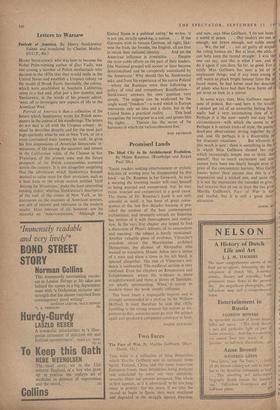Promised Lands
'ThosE readers seeking entertainment or stylistic felicities of writing may be disappointed by this book'—so Dr. Rosenau in her foreword. At such a warning the knowing reader will steel himself to being wearied and exasperated: but, he may think, wearied and exasperated in a good cause. The theme of Dr. Rosenau's book is not only splendid in itself; it has been of great conse- quence ,in the last few decades because it pro- vided the content of the best contemporary architecture: and strangely enough no historian has written of it with thoroughness and convic- tion. In the very first chapter one hoped to find a discussion of Plato's Atlantis, of its antecedents and meaning: the subject is barely mentioned. Another valuable piece of evidence, Vitruvius's anecdote 'about the Macedonian architect Deinocrates, the planner of Alexandria who wanted to transform Mount Athos into a statue of a man and place a town in his left hand, is ignored altogether. The rest of Vitruvius's evi- dence is maltreated. The medieval section is very confused. Even the chapters on Renaissance and Enlightenment, where the evidence is more straightforward and there is plenty of literature, are wholly unrewarding. When' it comes to modern times the book simply collapses.
The book bears a respectable imprint and is strongly commended in a preface by Sir William Holford. It must therefore he said that chilly fumbling is the wrong manner for matter as im- portant as this; someone must go over the subject again and produce a competent catalogue at least.
JOSEPH RYKWERT


































 Previous page
Previous page